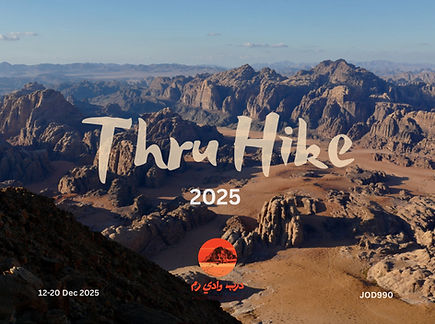Book a hike
The Wadi Rum Trail was founded by the Wadi Rum Trail Association: a group of Bedouin leaders representing different Bedouin families and tribes from Wadi Rum. The Wadi Rum Trail Association oversees the ongoing development of the Wadi Rum Trail, ensuring it serves its region, community and international visitors in the most positive way. As well as creating public information resources about the trail the Wadi Rum Trail Association oversees the maintenance and improvement of the path and organises all official journeys along it from individual trips to thru hikes. Hikers walking the Wadi Rum Trail must organise all trips through this website to ensure their trip is official. When booking through the Wadi Rum Trail Association hikers will be assured suitably experienced guides from the different families and tribes of Wadi Rum and are also guaranteed to follow the correct route beginning to end. A part of the fees paid for any hike through the Wadi Rum Trail Association go to helping our organisation fulfil its responsibilities including keeping this website live, maintaining the path and facilitating regular meetings with tribes and officials to keep the project moving forward. The Wadi Rum Trail exists for the Bedouin community of Wadi Rum and the Wadi Rum Trail Association ensures work upon the route is spread between the best guides from different sections of the local community, overviewed below. At the end of 2025, many families will collaborate on the first ever thru hike of the Wadi Rum Trail.
THE BEDOUIN FAMILIES OF WADI RUM
The Wadi Rum Trail Association works to ensure the Wadi Rum Trail is guided by people from the Bedouin families of Wadi Rum. Wadi Rum has a diverse Bedouin makeup, with 18 family groups representing five different tribes, all shown in this chart. The Zalabia clan of the Anaza tribe are Wadi Rum's biggest Bedouin group, comprising 11 families: in alphabetic order, El Aiyidiyeen, El Awadiyeen, El Awdaat, El Ayiliyeen, El Hamdiyeen, El Mubarkiyeen, El Muhamdiyeen, El Rubayeen, El Salmaniyeen, El Samran & El Zidaniyeen. The Bilawna family belong to the Billi tribe with the Juyaan family from a tribe called the Bani Atiya. El Madka, El Munaya, El Rubayi & El Sawalhiyeen are all families of the Howaytat, a large tribe who hold vast swathes of territory across Jordan, Egypt & Saudi Arabia. Families of a tribe called the Tarabin - of whom most now live in the Sinai - also live in Wadi Rum Village.

What are the costs?
As a community tourism project the Wadi Rum Trail advocates fair prices for Bedouin operators and hikers alike, seeking to set prices representing a fair level for both. Costs vary depending on how a hiker wants to travel the route. Walking it with camel support costs more than it does with 4x4 support. Completing the trail with all climbing and abseiling sections involved will also increase costs. Whether completing the route with camels or 4x4s, the prices quoted here all include food and water throughout a trip. Breakfast, lunch and dinner will be provided throughout, along with water and a plentiful supply of Bedouin tea. Bedouin guides on the Wadi Rum Trail will be able to communicate in English and will come from a pool of experienced guides who know the route well. For any climbing sections of the Wadi Rum Trail only experienced Bedouin climbing guides will be used, all of whom who have undergone specialist climbing training. Please note these prices do not include the hire of equipment such as tents, sleeping bags or climbing gear: the Wadi Rum Trail Association can not provide this equipment so all hikers must bring whatever equipment is necessary for their journey. Costs for a full thru hike of the Wadi Rum Trail are outlined below. The costs of shorter hikes will be similar but will depend on the journey you intend to do so please message us for more specific information for short routes. The Wadi Rum Trail will be organising its first ever thru hike this year: the trip will run from 12-20 December and will cost JOD970 per person. If you are interested in becoming part of the first team to walk the trail, message us quickly.

WADI RUM TRAIL: SHORT HIKES & SOLO HIKING
Most hikers walk only short sections of the trail, lasting 1-5 days. Prices above cover all multi day trips on the Wadi Rum Trail from full thru hikes to section hikes. We do not recommend trying to hike the Wadi Rum Trail solo i.e. independently, without Bedouin support. It traverses remote landscapes in which there is no water or food & navigation is intricate, especially on Bedouin climbing routes in the high mountains. The Wadi Rum Trail is working towards marking the trail & installing water tanks to ensure it can be walked solo but we are a small, community project without funding, meaning this is coming together at a slow pace that will take several years.

%20copy.jpg)
